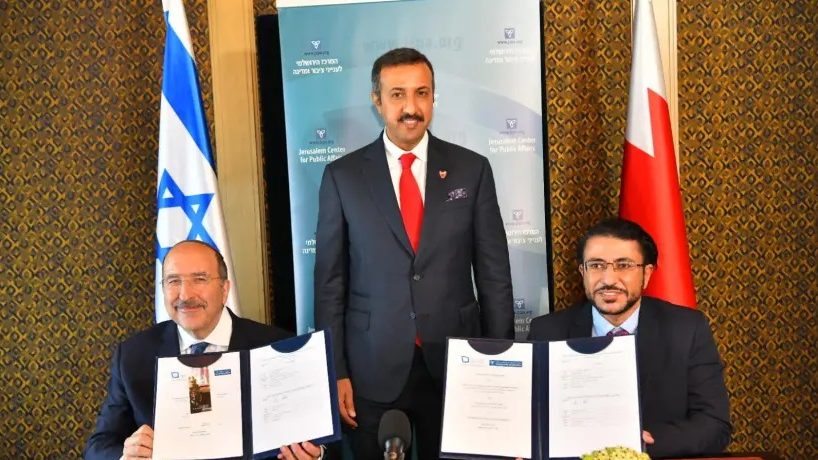One Year After Bahrain Normalizes Ties With Israel, Its Undersecretary for Political Affairs Visits Jerusalem
Al Khalifa blasts 2015 Iran nuclear accord, saying it fueled “more crises and more chaos in the region”
Bahrain’s Undersecretary for Political Affairs Dr. Shaikh Abdulla bin Ahmed Al Khalifa began a four-day visit to Israel on Sunday.
Al Khalifa is scheduled to meet with Israeli President Isaac Herzog, as well as with Foreign Minister Yair Lapid.
His visit coincides with the one-year anniversary of the announcement of normalization between the two countries.
On his third trip to Israel, Al Khalifa told The Media Line that his visit was a step in strengthening the ties between the two governments, but also in connecting universities, organizations, and research institutions.
“We have worked closely with the Foreign Ministry in Israel, and we have established a very solid foundation for bilateral relations,” the undersecretary said. “We have convened very constructive and fruitful meetings at the Foreign Ministry, and we believe it will build upon what has already been achieved in the past. We do believe there are great opportunities on different fronts. We have identified the priorities, we have identified the scope of things between the two countries,” he added.
As part of Al Khalifa’s trip, a cooperation agreement was signed between the Jerusalem Center for Public Affairs and Derasat, the Bahrain Center for Strategic, International, and Energy Studies.
This holiday season, give to:
Truth and understanding
The Media Line's intrepid correspondents are in Israel, Gaza, Lebanon, Syria and Pakistan providing first-person reporting.
They all said they cover it.
We see it.
We report with just one agenda: the truth.


Speaking at a press briefing at the King David Hotel in Jerusalem, Al Khalifa questioned the benefit of the 2015 landmark Iran nuclear deal, known officially as the Joint Comprehensive Plan of Action (JCPOA). “What did it leave us with?” he asked. It only encouraged “more crises and more chaos in the region,” he said.
“The JCPOA has caused more instigation and extremism in many different regions across the Middle East.”
Al Khalifa added that the JCPOA “has caused the death of tens of security forces and innocent civilians and thousands of injured security personnel.”
He said his country had hoped the accord “would open up a new page for Iran and the region.” However, he said, it had the opposite effect.
“But on the contrary, it has fueled crises across the Middle East. It has increased the number of refugees that have fled into Europe. It has caused more instigation of extremism and hatred in many different regions across the Middle East.”
Al Khalifa said that in the opinion of his government, the accord failed to deter Iran’s malign behavior in the region.
“What we see, speaking from a Bahraini perspective and the experience of my country with Iran, is continuous interference in the domestic affairs in my country,” including “support of extremism and terrorism, continuous smuggling of arms and explosives and drugs and narcotics,” said Al Khalifa.
The 2015 accord signed between Tehran and world powers gave Iran relief from international sanctions in exchange for limits on its nuclear program.
But US President Donald Trump withdrew from the deal and reimposed sanctions on Iran’s oil sector, which had been lifted as part of the agreement.
Official diplomatic relations between Israel and Bahrain were announced on September 11, 2020, but the two countries have maintained ties, mostly behind the scenes, for years.

